Hillary Clinton is set to welcome another grandchild in 2016
- Share via
By the numbers
Welcome to Trail Guide, your host through the wilds of the 2016 presidential campaign. It's Monday, Dec. 21, and here's what we're talking about:
- Hillary Clinton will welcome a second grandchild next summer
- Lindsey Graham calls it quits , thanks supporters
- As the calendar turns to 2016, Republicans fight one another while Democrats focus on November
- Polls may actually be understating support for Donald Trump , a new study suggests
- A growing drug abuse problem has New Hampshire residents demanding answers from presidential candidates
- No, there isn't any proof that Islamic State uses Trump in recruiting videos , as Clinton charged
ABC's Democratic primary debate scores 7.85 million viewers on Saturday
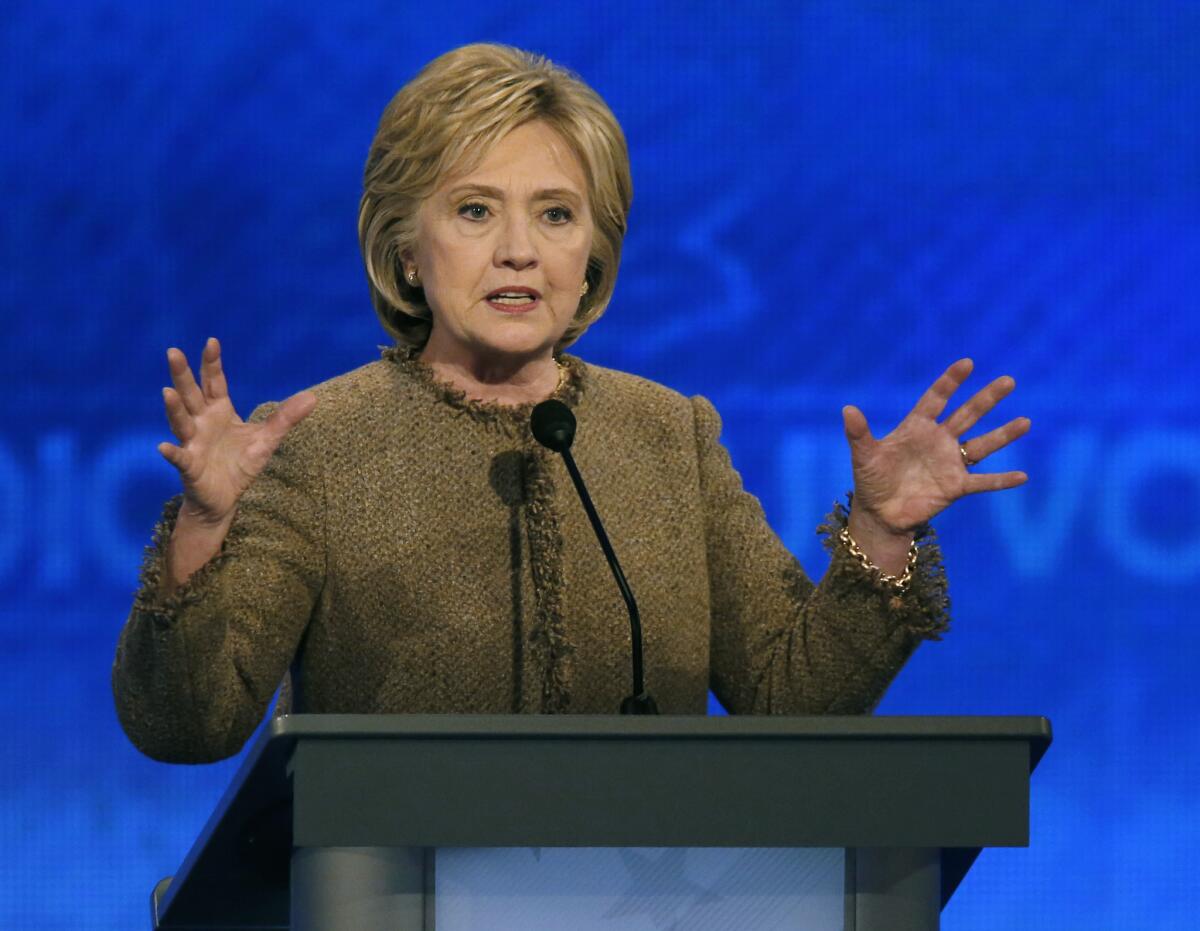
Hillary Clinton speaks during the Democratic presidential primary debate Saturday at St. Anselm College in Manchester, N.H.
The Democratic primary debate Saturday averaged 7.85 million viewers on ABC, making it the least-watched candidate showdown of the 2016 presidential race, according to Nielsen data.
Moderated by "ABC World News Tonight" anchor David Muir and the network's chief global affairs correspondent, Martha Raddatz, at Saint Anselm College in New Hampshire, the event was below the 8.55 million viewers that the last showdown among the Democrats had. That debate aired Nov. 14, also a Saturday night, on CBS.
The campaigns of Bernie Sanders and Martin O'Malley complained about the scheduling of the debate in New Hampshire on Saturday, the night of the week that typically has the smallest number of homes using television and the lowest ratings. Outside of live sports and the CBS newsmagazine "48 Hours," networks program the night with repeat episodes.
Carly Fiorina talks about a gift Hillary Clinton could receive this holiday season
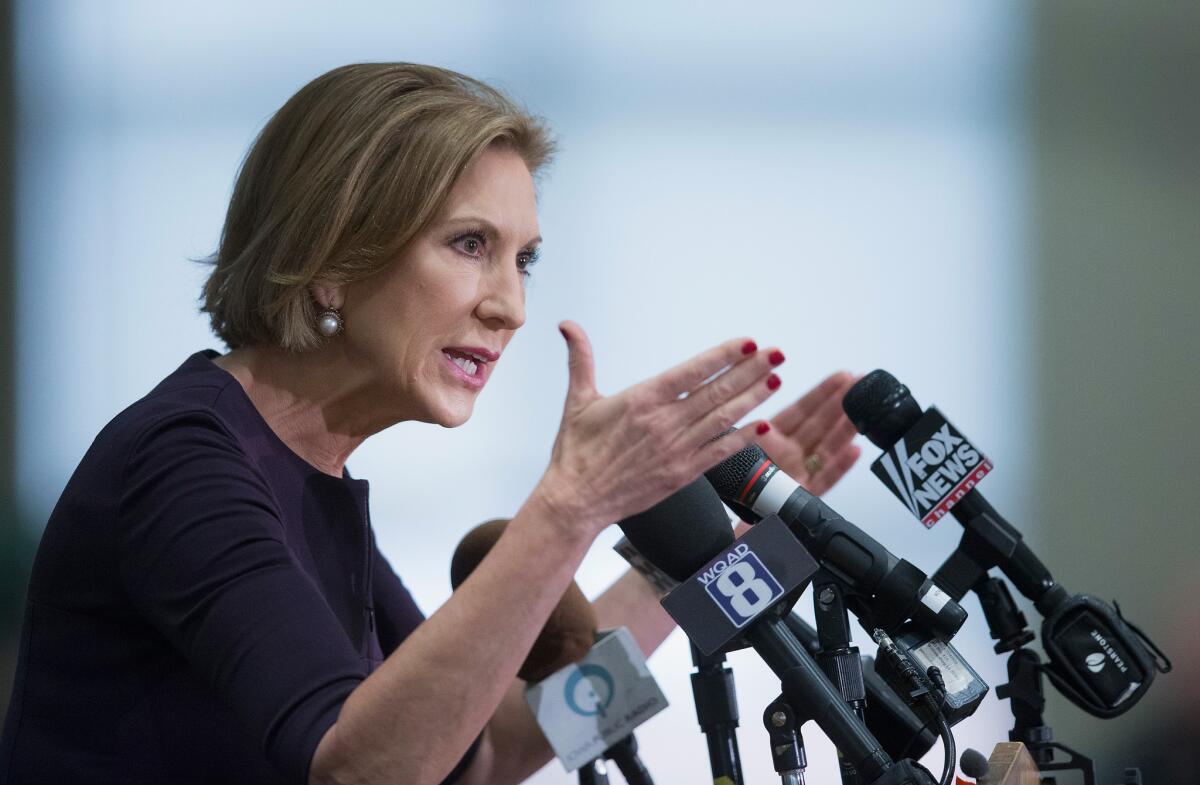
Republican Carly Fiorina campaigns in Davenport, Iowa.
Obama: Trump is 'exploiting' voters' unease
President Obama attributes Donald Trump's success to the "justified" but sometimes "misdirected" unease that some Americans feel about the pace of societal change, including such social trends as same-sex marriage and economic stresses lingering from the Great Recession.
In an interview with NPR, Obama said that Americans, as they have repeatedly throughout U.S. history, are wrestling with sweeping changes. Globalization, technology and other factors tied to recent economic trends have led blue-collar workers in particular to believe "they are no longer getting the same bargain that they got when they were going to a factory and able to support their families on a single paycheck," Obama said.
"There is going to be potential anger, frustration, fear," he added. "Somebody like Mr. Trump is taking advantage of that. That's what he's exploiting."
Obama’s assessment called to mind his 2008 campaign comment, made behind closed doors, about “bitter” small-town voters who “cling to guns or religion.” That observation, secretly recorded, created a firestorm for his campaign when it became public.
This time, Obama stressed that most Americans are receptive to such change. He pointed to his teenage daughters' generation, saying its members are "more tolerant, more welcoming of people who are different."
Obama was also asked whether he understood the belief or even fear of some Americans that he was trying to make changes to the country that were unacceptable to them.
Obama acknowledged that not all disagreements with him can be explained merely by opposing ideological and policy views, and that conspiracies about his birthplace and religion do get traction "in certain pockets of the Republican Party."
"That's not to suggest," he cautioned, "that everybody who objects to my policies may not have perfectly good reasons for it."
Hillary Clinton will welcome second grandchild in 2016
With Lindsey Graham's exit, GOP primary race no longer has foreign policy hawk
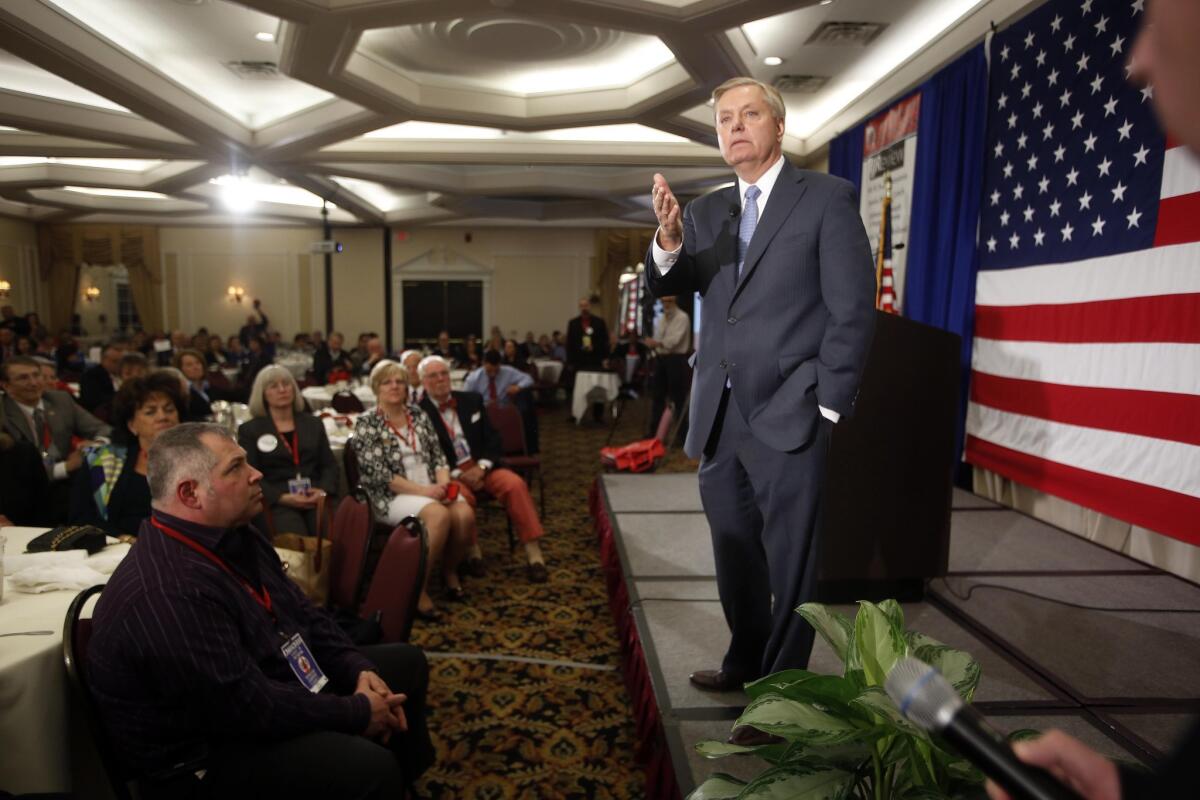
Sen. Lindsey Graham (R-S.C.) speaks at the Republican Leadership Summit in April in Nashua, N.H. He plans Monday to announce his bid for the party’s presidential nomination, joining a crowded field.
The exit of Sen. Lindsey Graham means the Republican presidential primary race has lost the voice of its only foreign policy hawk with military experience.
Graham, of South Carolina, serves on the Armed Services Committee and is an Air Force veteran, who was outspoken on national security while campaigning. He was the lone candidate to pinpoint an exact number of U.S. ground troops that should be sent to fight Islamic State (10,000 to Iraq and 10,000 to Syria). Right now, more than 3,500 troops are serving in advisory roles to the Iraqi army and fewer than 50 are assisting vetted Kurdish and Syrian rebel groups in northern Syria.
A recent CNN/ORC poll showed that, for the first time, a majority of Americans -- nearly 53% -- say the U.S. should send ground troops to Iraq and Syria to fight Islamic State. The results came days days before the San Bernardino shooting that left 14 people dead and after attacks in Paris that killed 130 and wounded hundreds more. Both were ISIS-inspired attacks.
But Graham’s message never resonated with voters; he barely registered in polls and never participated in any of the main debates, once even failing to qualify for the second-tier debate of lower-polling candidates.
In announcing Monday that he was ending his campaign, Graham said that keeping the U.S. safe remains his No. 1 objective.
“I got into this race to put forward a plan to win a war we cannot afford to lose,” he said.
“I said that any candidate that did not understand we need more American troops on the ground in Iraq and Syria to defeat ISIL was not ready to be commander-in-chief,” he added, using an acronym for Islamic State.
He noted that several months ago, when he first initiated calls for more ground troops, few of his rivals stepped forward in support, yet now, after the Paris and San Bernardino attacks, a majority support more ground forces, including front-runner Donald Trump and Sen. Marco Rubio of Florida.
Other candidates, including Sens. Ted Cruz of Texas and Rand Paul of Kentucky do not support an increased U.S. ground operation in the Middle East. Cruz has instead called for increasing the U.S.-led coalition’s pace of bombing Islamic State targets and directly arming Kurdish fighters to retake and hold territory in the region.
Graham’s exit from the race leaves just one candidate, former Virgina Gov. Jim Gilmore, who has not appeared in any of the debates because he’s polling at 0%, as the only presidential hopeful with military experience. He served in the U.S. Army.
Former Texas Gov. Rick Perry, who suspended his campaign in September, served in the Air Force.
New Hampshire demands to know how candidates will help fight against drug abuse
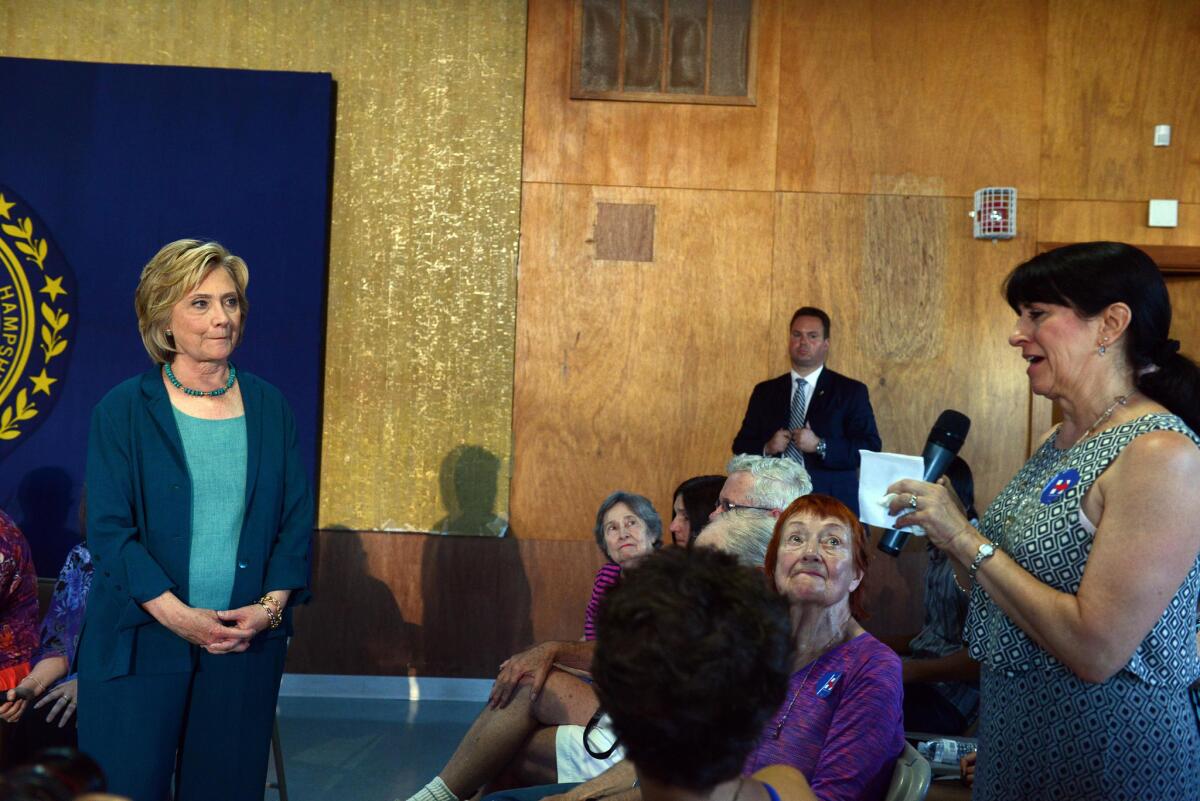
Democratic presidential candidate Hillary Clinton listens at a forum in Laconia, N.H., on Sept. 17 as Cindie Graham talks about losing a loved one to drugs.
A sharp increase in heroin overdoses over the last 18 months, particularly in the Northeast, and New Hampshire's first-in-the-nation presidential primary are placing the issue squarely in front of the country as candidates barnstorm the state.
At town halls, in diners and at house parties, candidates of both parties are hearing tales from anguished voters about drug addiction in their families. And the White House hopefuls are repeatedly grilled about their approach to fighting drug abuse.
"If they didn't get it before they started campaigning, they certainly get it now," said Tim Soucy, director of Manchester's Public Health Department. "We've always had heroin and opioid addiction issues, but it has really exploded. It's so cheap and so readily available."
Lindsey Graham opts out of 2016 race, claiming his message has won
South Carolina Sen. Lindsey Graham, who managed to fuse a light sense of humor with the most ominous warnings about national security on the Republican stage, ended his presidential campaign Monday morning.
By bowing out before any votes are cast, Graham might be trying to preserve what little leverage his endorsement holds in the South Carolina primary. But Graham’s blessing may not be worth much in his home state, where his recent polling average is less than 2%.
Graham is an experienced lawmaker who is well-liked by colleagues in the Senate. But in a year when anti-establishment candidates have provided much of the excitement in the GOP primary season, Graham had little chance of breaking through in the crowded field. He was usually relegated to the second debate stage and failed to qualify for either stage in one GOP debate because his polling average was below 1%.
Instead, he hoped to influence the party by pushing a hawkish military policy. He has said repeatedly that anyone who hopes to become president needs to pledge more ground troops in Iraq and Syria to fight against Islamic State.
“The centerpiece of my campaign has been securing our nation,” Graham said in a video Monday, announcing that he was suspending his campaign. “I got into the race to put forward a plan to win a war we cannot afford to lose and to turn back the tide of isolationism that was rising in our party.”
Graham noted in the video that many of his colleagues now agree with him. Kentucky Sen. Rand Paul, the most cautious Republican when it comes to foreign engagement, has also fared poorly in polls, despite signs last year that his views could hold greater influence in the party.
Graham may be best known for his close ties with Sen. John McCain of Arizona. During McCain’s 2008 presidential bid, Graham was frequently at his side as a close supporter and advisor.
“Republicans lost our most qualified, thoughtful, fearless and honest presidential candidate, not to mention the candidate with the best [and it seemed sometimes the only] sense of humor,” McCain said in a statement. “… Lindsey’s message of serious statesmanship and problem-solving in public affairs, his forthright opposition to policies and attitudes that would endanger our country and reflect poorly on our party, and his genuine decency and humility won him many new admirers.”
Trump on 'Today': Commenting on Miss Universe mishap and demanding a Clinton apology
The mistaken crowning of Miss Colombia as Miss Universe on Sunday turned into fodder for GOP candidate Donald Trump. On NBC Monday, Trump talked about the mixup — Miss Philippines was the intended winner of the crown — and shared his thoughts as a previous stakeholder in the Miss Universe pageant.
"I'd make 'em a co-winner. It'd be very cool," Trump told NBC "Today" host Matt Lauer. "I would recommend that they go have a beautiful ceremony, which is good for the brand and good for Miss Universe, and do a co-winner."
He also claimed, on his usual Twitter platform, that had he kept his stake in the pageant, the mistake never would have happened. He sold it after a dispute with NBC over his comments on immigrants in the country illegally.
During the show, he also reiterated his demand for Democratic front-runner Hillary Clinton to apologize for comments she made during the Democratic debate in New Hampshire on Saturday.
Clinton said the Islamic State uses Trump in propaganda videos because of his calls to ban Muslim travel to the United States and create a registry to track all Muslims in the country. Clinton’s campaign went back on a few of her comments after the debate, though, and said that she didn’t have a video in mind, but that Islamic State references Trump on social media to push its message.
Trump denied Clinton’s statements.
"She lies about emails, she lies about Whitewater, she lies about everything," he said in the NBC interview. "She will be a disaster as president."
Lindsey Graham ends long-shot presidential bid
Sanders: Trump not trustworthy
Republican and Democratic presidential candidates resorted to calling each other liars after Saturday's Democratic debate in New Hampshire, with GOP candidate Donald Trump attacking Democratic front-runner Hillary Clinton and her rival, Bernie Sanders of Vermont. Sanders fired back in similar fashion.
“I fear that Donald Trump is doing a great disservice to our country internationally, fanning hatred of the United States all over the world," Sanders said in a Monday interview with CBS.
He also repeated his stance, first made Sunday during an ABC interview, that the real estate magnate is a “pathological liar.”
For example, Sanders said on ABC, there's no video evidence to back up Trump’s claim there were Muslims celebrating in New Jersey after the 9/11 attacks.
"Either it is true or it is not true," Sanders said. "Nobody has seen a tape of thousands of people celebrating the destruction of the Twin Towers in New Jersey. It doesn't exist, and [Trump] keeps claiming it. That's called pathological lying."
During Saturday’s debate, Clinton said Islamic State has used video of Trump as a propaganda tool. That claim is not verified, and Trump vehemently denied the statement and demanded an apology from Clinton.
Sanders pointed to Trump’s own anti-Muslim claims to bolster his attack on the GOP candidate’s credibility.
“But what Trump says – and this isn’t new, this is what demagogues all over the world historically have done – is say, ‘Are you nervous? Are you scared? Are you frightened for the future? I’ll tell you the reason. It’s the Muslims,’” Sanders said on ABC.
Polls may be understating Trump's support
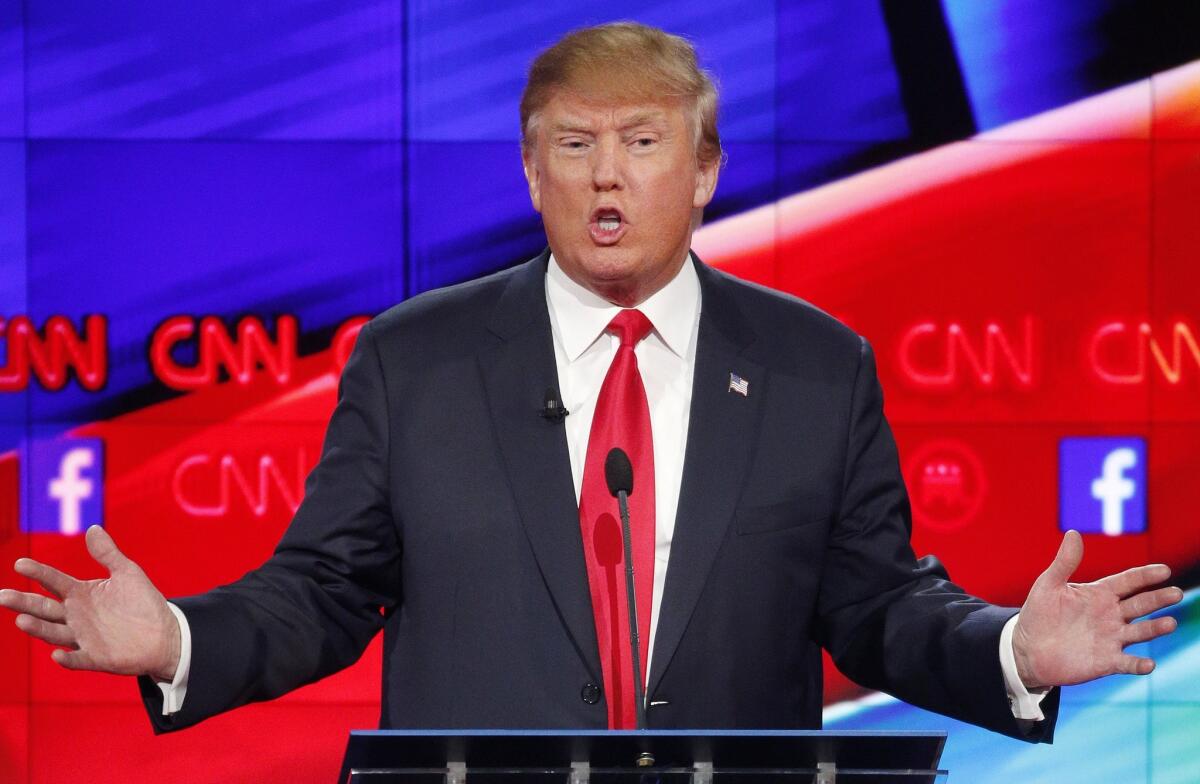
Donald Trump makes a point during the CNN Republican presidential debate in Las Vegas on Dec. 15.
Donald Trump leads the GOP presidential field in polls of Republican voters nationally and in several early-voting states, but some polls may actually be understating his support, according to a new study.
The analysis, by Morning Consult, a polling and market research company, looked at an odd occurrence that has cropped up repeatedly this year: Trump does better in online polls than in surveys done by phone.
Why is that, and which polls are more accurate -- the online surveys that tend to show Trump with support of nearly four-in-10 GOP voters or the telephone surveys that have generally shown him with backing of one-third or fewer?
Donald Trump wants Hillary Clinton to apologize
Hillary Clinton claimed during Saturday night's Democratic presidential debate that Islamic State militants are "going to people showing videos of Donald Trump insulting Islam and Muslims in order to recruit more radical jihadists." She called him "ISIS' best recruiter," using an alternative name for the extremist group.
Trouble is, there appears to be no such video. And now Trump, who said Sunday that Clinton "lies like crazy," is following up with his demand for an apology.
Obama: Republican candidates have no real alternative on Islamic State
President Obama said Republican candidates’ tough talk on Islamic State masks the reality that they "don’t have an answer" when it comes to an alternative to defeat the extremists.
In an interview with NPR airing Monday, the president defended his strategy – saying it was based on the best advice of the nation’s top military, intelligence and diplomatic teams.
"Unfortunately, many of these critics can get away with just suggesting that bombing more, or being less discriminant in how we approach that, would make a difference," he said. "Let me put it this way. I trust my commanders."
Obama’s comments on the battle against Islamic State come as Democratic presidential front-runner Hillary Clinton faces a barrage of criticism from Republicans for saying in Saturday’s debate that we "finally are where we need to be" with regard to Islamic State.
"Either she is painfully naive or she is lying to the American people in order to get their vote," New Jersey Gov. Chris Christie told voters at a town hall meeting in Peterborough, N.H., on Sunday night.
Obama acknowledged that his administration has not done enough to communicate with the public about its approach to defeating Islamic State, but seemed to pin some blame on a media "pursuing ratings" by portraying the militant group as a more direct threat to the U.S. than it is.
"If you've been watching television for the last month, all you have been seeing, all you have been hearing about is these guys with masks or black flags who are potentially coming to get you," he said.
Asked to offer advice to his successor, the president offered: "It is important not just to shoot but to aim."
"I make no apologies for us wanting to do this appropriately and in a way that is consistent with American values," he said.
In the interview, Obama also expressed confidence that a Democrat would win the race to succeed him and said his party also had a good chance of winning back control of the Senate. The president said he expects to be on the campaign trail.
"One of the things that I will be arguing over the course of the next year is to make sure that Democrats run an issue-based campaign on the things that we believe in and care about," he said. "I think we've got a great track record of real progress on a whole range of fronts."
As calendar turns to 2016, focuses of Republican and Democratic hopefuls differ
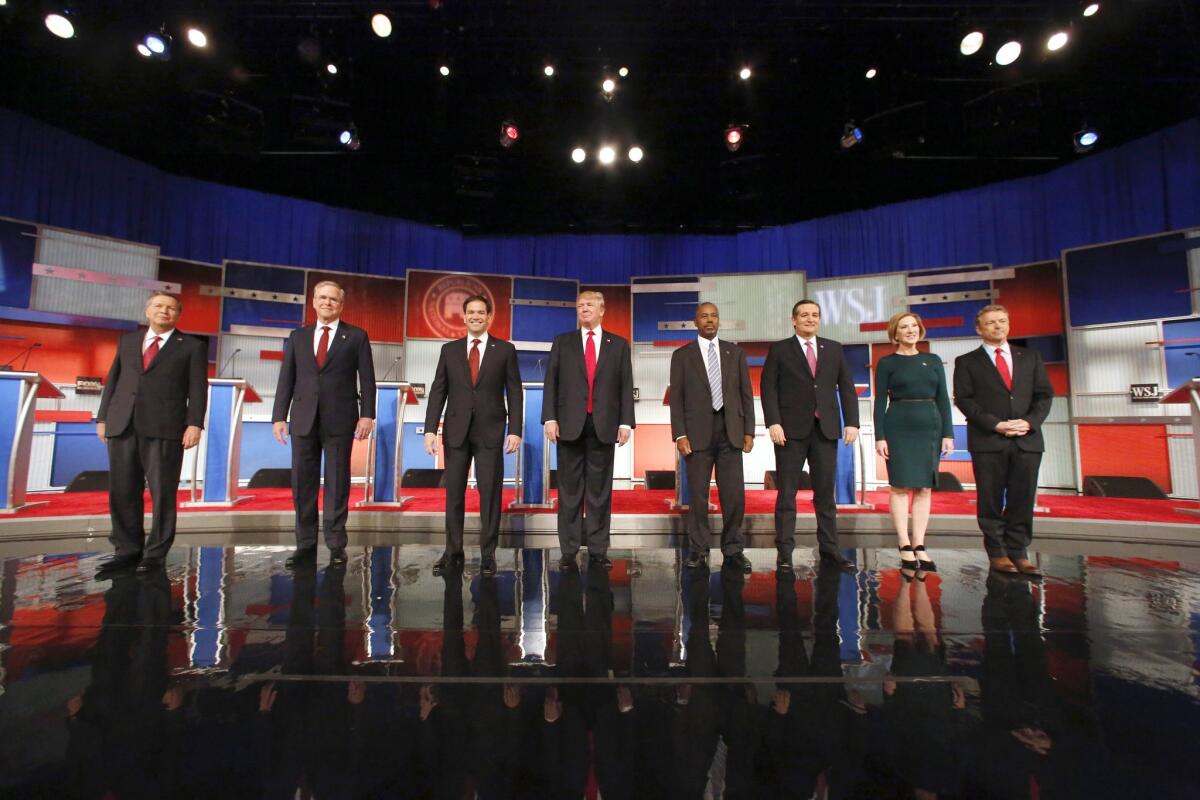
Republican presidential hopefuls, shown in November, return Tuesday night to the debate stage.
The sharpest contrast between Tuesday night's Republican presidential debate and Saturday's Democratic face-off was not tone, although the difference was marked, or the number of candidates. It was the time horizon: While the GOP anxiously eyes February's primaries, the Democrats already have shifted focus to November's general election.
Their long view could be seen Saturday as former Secretary of State Hillary Clinton, the Democratic front-runner, and Sen. Bernie Sanders of Vermont, her main challenger, passed up chances to go on the attack:
Sanders apologized for his aides having raided the Clinton campaign's voter files. Clinton said both campaigns should “move on” to other issues.
When Martin O'Malley criticized both of them for inconsistency on gun control, Clinton and Sanders defended each other. Clinton, having successfully bashed Sanders on gun issues for much of October and November, complimented him for altering his stand.
By the numbers
Get the L.A. Times Politics newsletter
Deeply reported insights into legislation, politics and policy from Sacramento, Washington and beyond. In your inbox twice per week.
You may occasionally receive promotional content from the Los Angeles Times.




